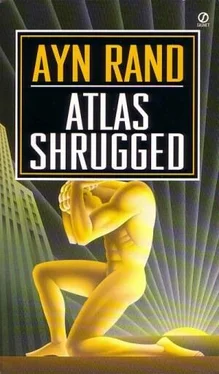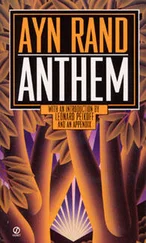The rest of her staff had gone, when she entered the anteroom of her office, but Eddie Willers was still there, waiting for her. She knew at once that something had happened, by the way he looked and the way he followed her silently into her office.
"What's the matter, Eddie?"
"McNamara quit."
She looked at him blankly. "What do you mean, quit?"
"Left. Retired. Went out of business."
"McNamara, our contractor?"
"Yes"
"But that's impossible!"
"I know it."
"What happened? Why?"
"Nobody knows."
Taking her time deliberately, she unbuttoned her coat, sat down at her desk, started to pull off her gloves. Then she said, "Begin at the beginning, Eddie. Sit down."
He spoke quietly, but he remained standing. "I talked to his chief engineer, long distance. The chief engineer called from Cleveland, to tell us. That's all he said. He knew nothing else."
"What did he say?"
"That McNamara has closed his business and gone."
"Where?"
"He doesn't know. Nobody knows."
She noticed that she was holding with one hand two empty fingers of the glove of the other, the glove half-removed and forgotten. She pulled it off and dropped it on the desk.
Eddie said, "He's walked out on a pile of contracts that are worth a fortune. He had a waiting list of clients for the next three years. . . ."
She said nothing. He added, his voice low, "I wouldn't be frightened if I could understand it. . . . But a thing that can't have any possible reason . . ." She remained silent. "He was the best contractor in the country."
They looked at each other. What she wanted to say was, "Oh God, Eddie!" Instead, her voice even, she said, "Don't worry. We'll find another contractor for the Rio Norte Line,"
It was late when she left her office. Outside, on the sidewalk at the door of the building, she paused, looking at the streets. She felt suddenly empty of energy, of purpose, of desire, as if a motor had crackled and stopped.
A faint glow streamed from behind the buildings into the sky, the reflection of thousands of unknown lights, the electric breath of the city.
She wanted to rest. To rest, she thought, and to find enjoyment somewhere.
Her work was all she had or wanted. But there were times, like tonight, when she felt that sudden, peculiar emptiness, which was not emptiness, but silence, not despair, but immobility, as if nothing within her were destroyed, but everything stood still. Then she felt the wish to find a moment's joy outside, the wish to be held as a passive spectator by some work or sight of greatness. Not to make it, she thought, but to accept; not to begin, but to respond; not to create, but to admire. I need it to let me go on, she thought, because joy is one's fuel.
She had always been—she closed her eyes with a faint smile of amusement and pain—the motive power of her own happiness. For once, she wanted to feel herself carried by the power of someone else's achievement. As men on a dark prairie liked to see the lighted windows of a train going past, her achievement, the sight of power and purpose that gave them reassurance in the midst of empty miles and night —so she wanted to feel it for a moment, a brief greeting, a single glimpse, just to wave her arm and say: Someone is going somewhere. . . .
She started walking slowly, her hands in the pockets of her coat, the shadow of her slanting hat brim across her face. The buildings around her rose to such heights that her glance could not find the sky. She thought: It has taken so much to build this city, it should have so much to offer.
Above the door of a shop, the black hole of a radio loudspeaker was hurling sounds at the streets. They were the sounds of a symphony concert being given somewhere in the city. They were a long screech without shape, as of cloth and flesh being torn at random. They scattered with no melody, no harmony, no rhythm to hold them. If music was emotion and emotion came from thought, then this was the scream of chaos, of the irrational, of the helpless, of man's self-abdication.
She walked on. She stopped at the window of a bookstore. The window displayed a pyramid of slabs in brownish-purple jackets, inscribed: The Vulture Is Molting. "The novel of our century," said a placard.
"The penetrating study of a businessman's greed. A fearless revelation of man's depravity."
She walked past a movie theater. Its lights wiped out half a block, leaving only a huge photograph and some letters suspended in blazing mid-air. The photograph was of a smiling young woman; looking at her face, one felt the weariness of having seen it for years, even while seeing it for the first time. The letters said: ". . . in a momentous drama giving the answer to the great problem: Should a woman tell?"
She walked past the door of a night club. A couple came staggering out to a taxicab. The girl had blurred eyes, a perspiring face, an ermine cape and a beautiful evening gown that had slipped off one shoulder like a slovenly housewife's bathrobe, revealing too much of her breast, not in a manner of daring, but in the manner of a drudge's indifference. Her escort steered her, gripping her naked arm; his face did not have the expression of a man anticipating a romantic adventure, but the sly look of a boy out to write obscenities on fences.
What had she hoped to find?—she thought, walking on. These were the things men lived by, the forms of their spirit, of their culture, of their enjoyment. She had seen nothing else anywhere, not for many years.
At the corner of the street where she lived, she bought a newspaper and went home.
Her apartment was two rooms on the top floor of a skyscraper. The sheets of glass in the corner window of her living room made it look like the prow of a ship in motion, and the lights of the city were like phosphorescent sparks on the black waves of steel and stone. When she turned on a lamp, long triangles of shadow cut the bare walls, in a geometrical pattern of light rays broken by a few angular pieces of furniture.
She stood in the middle of the room, alone between sky and city.
There was only one thing that could give her the feeling she wanted to experience tonight; it was the only form of enjoyment she had found.
She turned to a phonograph and put on a record of the music of Richard Halley.
It was his Fourth Concerto, the last work he had written. The crash of its opening chords swept the sights of the streets away from her mind.
The Concerto was a great cry of rebellion. It was a "No" flung at some vast process of torture, a denial of suffering, a denial that held the agony of the struggle to break free. The sounds were like a voice saying: There is no necessity for pain—why, then, is the worst pain reserved for those who will not accept its necessity?—we who hold the love and the secret of joy, to what punishment have we been sentenced for it, and by whom? . . . The sounds of torture became defiance, the statement of agony became a hymn to a distant vision for whose sake anything was worth enduring, even this. It was the song of rebellion—and of a desperate quest.
She sat still, her eyes closed, listening.
No one knew what had happened to Richard Halley, or why. The story of his life had been like a summary written to damn greatness by showing the price one pays for it. It had been a procession of years spent in garrets and basements, years that had taken the gray tinge of the walls imprisoning a man whose music overflowed with violent color.
It had been the gray of a struggle against long flights of unlighted tenement stairs, against frozen plumbing, against the price of a sandwich in an ill-smelling delicatessen store, against the faces of men who listened to music, their eyes empty. It had been a struggle without the relief of violence, without the recognition of finding a conscious enemy, with only a deaf wall to batter, a wall of the most effective soundproofing: indifference, that swallowed blows, chords and screams—a battle of silence, for a man who could give to sounds a greater eloquence than they had ever carried—the silence of obscurity, of loneliness, of the nights when some rare orchestra played one of his works and he looked at the darkness, knowing that his soul went in trembling, widening circles from a radio tower through the air of the city, but there were no receivers tuned to hear it.
Читать дальше










